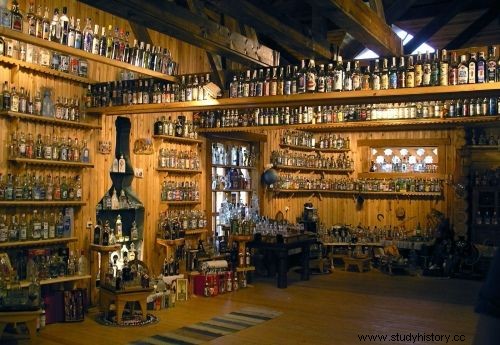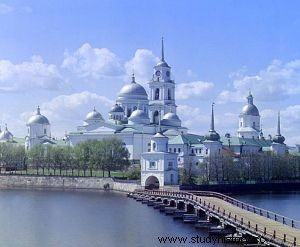Russian culture includes Pushkin, Shostakovich and Dostoyevsky, but also - of course - vodka! Alcohol played a significant role in Russia even before such a name for the country was even invented. He was one of the pillars of the economy and ... a real nightmare for the Russian peasants.
As early as in the Middle Ages, brewing beer was one of the duties of the Ruthenian peasants. They did not prepare it at all for their own needs, but for the landowners:boyars, princes and monastic authorities. Both the finished beer and the hops used in its preparation were extremely valuable goods. Hops was actually - to some extent - a currency, replacing silver coins .
In many Ruthenian estates, peasants were obliged to pay their lord regular tributes from hops which they collected in the forests. In other estates - for example near Nowogrod - the tribute was not hops, but malt, also used for brewing beer. It is worth adding that various officials received their remuneration in the form of malt. For example, princely tax collectors received 7 buckets a week ! A similar payment system must have existed already in the 14th century, because it was described on Novgorod grammars made of birch bark - archaic, Ruthenian book prototypes.
Hopeful business
Higher social classes made a lot of money on the trade in alcohol and its ingredients, and beer is mentioned in dozens of Ruthenian sources from the late Middle Ages and the early modern era. Kettles for brewing beer boyars bequeathed to children (example from the 16th century). Mighty gentlemen could afford a greater gesture and in their wills they bequeathed entire breweries to monasteries ( breweries ). This was done in the middle of the 16th century by a certain Jerzy Andrzejewicz Oboleński.

Vodka Museum near St. Petersburg. Russian alcohol culture in a nutshell! (photo:Veikia, license CC ASA 3.0).
Orthodox monasteries generally paid much attention to the production of alcohol. Artur Kijas, the author of the book "The feudal's own farm in Great Russia from the 14th to the mid-16th century" explains that monasteries (e.g. Cyril-Biełozierski and Spaso-Przyłucki) often had rooms in which kvass was produced , or so-called "acid works". Besides:

Russian monasteries. Centers of spiritual life… and alcohol production.
In the utility rooms of the farms [ie farms - ed. of the author of the article] monasteries there were a large number of kettles and buckets used for the production of acid and beer. Monasteries were also supplied with vessels needed to brew beer on the market square. There was a separate category of people specializing in brewing beer in monasteries, as well as in princely villages.
As you can see, a completely business organization! Members from abroad were also hosted with drinks - and generously at that. This was the custom both among secular and church lords. The Flemish traveler and diplomat Gilbert de Lannoy recalled that during his visit to Novgorod in 1413, he received honey and beer from the archbishop every day.
Moscow fire water
Of course, it is not beer, but booze, which we associate most with Russian culture. As Artur Kijas writes, vodka began to be produced in the Grand Duchy of Moscow in the second half of the 15th century. Feudal farms had a strict monopoly on its production. The same principle applied to almost any type of alcohol. In other words, as it is easy to guess, it was the common people who suffered the most from the love of the Muscovite elite for alcohol .

The article is based on the book by Artur Kijas entitled "The feudal's own farm in Great Russia from the 14th to the mid-16th century" (UAM Scientific Publishers, 1973).
Ivan III Srogi (1462-1505) introduced restrictions that, for example, are in force in Poland until today, and thus he banned the production of alcohol at home for private use. Peasants could produce honey, beer or booze only on the occasion of family and church holidays. On other days, had to buy drinks from monastic breweries and distilleries . Their torment did not end there. There was also a compulsory custom in Rus to greet all guests with fresh alcohol. No wonder that for decades peasants complained about uninvited guests who forced them expensive refreshments ... These complaints finally reached Grand Duke Vasil II himself, but even his intervention did not help much.
Surprisingly, all these problems did not kill the Russians' love of alcohol. On the contrary! Well, that's a topic for a separate article.
Source:
- Artur Kijas, The feudal's own farm in Great Russia from the 14th to the mid-16th century , Scientific Publisher of the University of Adam Mickiewicz in Poznań, 1973.
